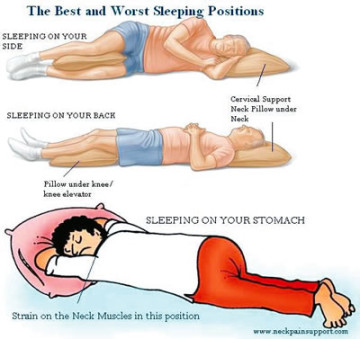Improve your well-being with good sleeping position
For many people, getting a good night’s rest is usually an impossible task. They hit the bed with the hope of enjoying sound sleep, but they usually experience bouts of sleeplessness. They toss from one end of the bed to the other, yawning in frustration and waiting for a miracle to happen.
For such people, they can’t truthfully give a positive answer when you ask them how the night has been.
Yet, sleep is very important for our overall wellbeing, what with the fact that we spend one-third of our lives asleep!
Besides, experts say the quantity of sleep we need changes as we age. Paediatricians say a newborn needs between 16 and 18 hours of sleep daily; while young adults such as teenagers, and full-fledged adults need just between seven and eight hours of good sleep daily.
Of course, what you eat before sleep matters a great deal if you must sleep soundly; ditto the drinks you take before attempting to sleep. All these are capable of determining how soon you’d fall asleep and how soundly you’d sleep.
Scientific studies have concluded that when you don’t sleep well, you can become irritable, while you may also experience premature ageing and obesity. All these happen because sleeplessness leads to imbalance in the body’s hormones, preventing your body’s natural repair process.
Again, if you don’t enjoy good sleep, experts say, you may be unable to concentrate on the task on hand, and you risk suffering anxiety and depression because of the attendant stress.
Family Physician, Dr. Debola Peters, says sometimes they see patients who present with severe back pain with no organic origin; and that when they engage the patients in discussion about their sleeping positions, they usually discover that it’s the positions they assume while sleeping that cause their pains.
Again, he says, it’s important that you do not maintain the same sleeping position consistently. “This is because when you sleep on one side for a long period, it can create an imbalance in your body.
“It’s one reason why sick patients who are unable to move their bodies often develop bed sores in that part of the body they rest upon,” Peters explains.
Many of us are unaware of this fact, but sleep experts are saying that the position you assume when you want to sleep not only determines how soundly you would sleep, but it can also impact your health in many ways than one, hence the need to know what to do each time you climb the bed to sleep. What are these positions? Read on.
Back-to-sleep
Peters agrees that the best sleeping position might also be the hardest to maintain by anyone.
He says, “The best and effective way to sleep is to lay on your back, with your arms resting on the bed by your sides.
“It’s a position that actually reduces pressure from your back and neck, while it also relaxes the backbone, removing traces of back pain.”
But then, we also know that only a baby who has not started to roll over can maintain such a rigid position all night if no one changes him. The physician therefore suggests that there are other sleeping positions that are equally effective in not only enabling you to sleep but also in positively impacting your health.
Side-sleeping
Experts say while many people find this position comfortable, its downsides are better imagined. Peters says in terms of clinical presentation, sleeping on your sides with the arms stretched out in front of you might give you pains in the shoulders when you wake up, because the position restricts blood flow and places pressure on your nerves.
On the other hand, physical therapists say, when a pregnant woman sleeps on her left side, using a pillow that supports the neck and head in a neutral position, she will enjoy good blood flow to the foetus.
Sleeping on the right side is not encouraged, however; as it places pressure on your internal organs such as the liver, kidneys, etc.
Face down
Many people take to sleeping face down simply because it is one of the most convenient postures to take. In fact, mothers would tell a child who has tummy ache to lay face down in order to relieve the pain.
Peters says this position can, indeed, improve digestion. “The downside, however, is that it could also give you back pain since the position doesn’t support the curve of the spine,” he warns.
He adds that the position might also place much strain on the neck because you’d have to tilt your face in one direction.
However, physical therapist, Ms. Busola Olaniran, says if you want to reduce snoring and also if you do not have neck or back pain, you may sleep on your belly once in a while.
Foetal position
For many people, taking a curled-up position like a foetus is the way to go when they want to sleep. Yet, Olaniran says it’s one of the positions that could earn you neck and back pain -especially if you suffer arthritis pains on the back or joints.
She notes that if you indulge in extremely curly position, you may have issues with deep breathing, though it may also afford you the opportunity to sleep like a baby.
The bottom line
Whichever position you take isn’t likely to be permanent, since you change positions during sleep anyway. Note which position works for you and work at it.
PUNCH.








